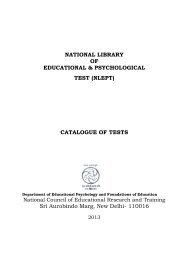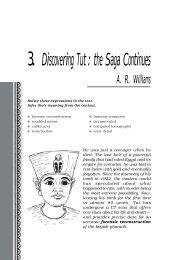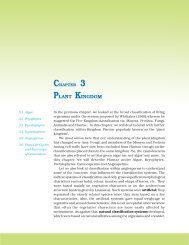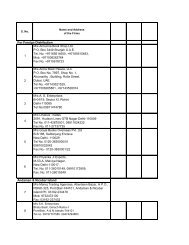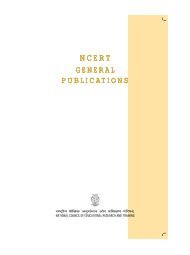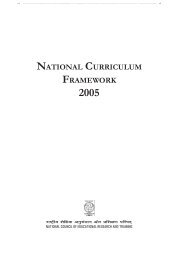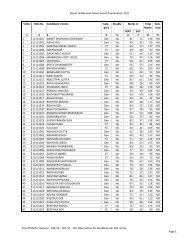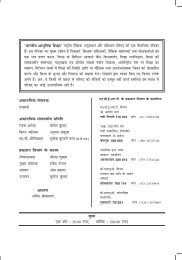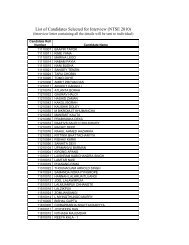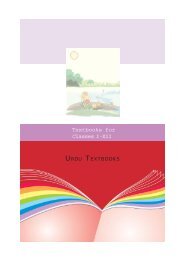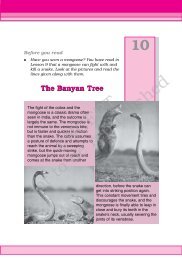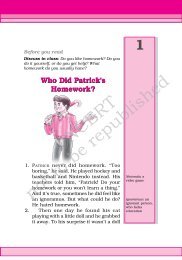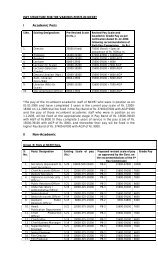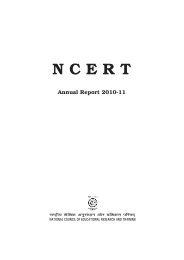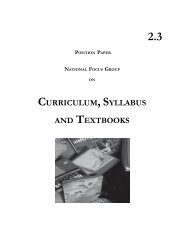indian education - National Council Of Educational Research And ...
indian education - National Council Of Educational Research And ...
indian education - National Council Of Educational Research And ...
You also want an ePaper? Increase the reach of your titles
YUMPU automatically turns print PDFs into web optimized ePapers that Google loves.
Reinventing the Paradigm of Teaching 51<br />
review the framework at regular<br />
intervals. In spite of the various<br />
recommendations as per NPE 1986 the<br />
school <strong>education</strong> remained to be exam<br />
oriented, bookish and information loaded<br />
devoid of practical aspects. The recent<br />
<strong>National</strong> Curriculum Framework–2005<br />
focuses on the following issues:<br />
● Connecting knowledge to life<br />
outside.<br />
● Shift from rote learning to<br />
constructing knowledge.<br />
● Providing wide range experiences<br />
for overall development of a child.<br />
● Bringing flexibility in the<br />
examinations.<br />
The development in technology has<br />
changed the world outside the<br />
classroom; it is more eye-catching and<br />
interesting for a student than the<br />
classroom setting. As a result students<br />
find classroom instructions as dull and<br />
devoid of life and do not interest them<br />
for learning. The information technology<br />
has made learner WWW afflicted:<br />
WWW Share discoveries and discussions.<br />
WWW Continually provide students<br />
with enrichment outside of class<br />
hours.<br />
WWW Provide follow-up on weekly<br />
activity schedules.<br />
WWW Maintain instructions for<br />
groups and individuals.<br />
WWW Encourage students to make<br />
more efficient and intense use of<br />
computers.<br />
Teacher has a tough time to arrange<br />
for different kind of learning experiences<br />
for catching attention of students,<br />
persisting their motivational level,<br />
energizing them to work in new situations<br />
with limited resources.<br />
As per <strong>National</strong> Curriculum<br />
Framework–2005, “The curriculum must<br />
enable children to find their voices,<br />
nurture their curiosity – to do things, to<br />
ask questions and to pursue<br />
investigations, sharing and integrating<br />
their experiences with school knowledge<br />
rather than their ability to produce<br />
textual knowledge”.<br />
The most important aspect of learning<br />
are developing capacity for abstract<br />
thinking, reflection and students learn<br />
in variety of experiences like reading,<br />
experimenting, listening, thinking,<br />
reflecting, writing , expressing oneself in<br />
speech, etc. Thus, conceptual<br />
understanding can be developed by<br />
engaging students actively in learning<br />
process. Active involvement involves<br />
exploration, enquiry, questioning,<br />
discussion, reflection leading to creation<br />
of ideas. Hence, before the teacher the<br />
challenge is process of active<br />
involvement and learning various<br />
concepts. The curriculum framework<br />
emphasises developing critical thinking<br />
among students making them active<br />
learners this can be made possible by<br />
taking advantage of ICT and working on<br />
multiple intelligence models.<br />
Emphasising Critical Thinking by<br />
way of Multiple Intelligence in<br />
<strong>Educational</strong> Practices<br />
The above mentioned discussion<br />
indicates that the new curriculum<br />
framework is very decisive about<br />
developing critical thinking. Critical<br />
thinking emphasises the ability and<br />
tendency to gather, evaluate and use<br />
information effectively (Beyer, 1985).<br />
The researches conducted in the area<br />
have identified several distinct skills



